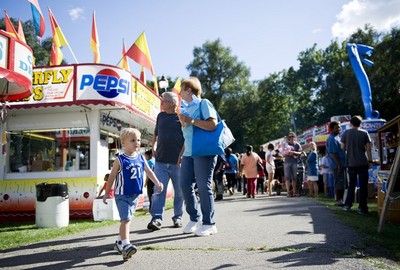Some Ypsilanti festivals will see an increase next year in what they pay the city for maintaining its park system.
The Ypsilanti City Council approved a new fee schedule that includes increased park fees at its July 2 meeting.

Ethan Bytner walks with his grandparents, Tom and Debbie Freedle, through the Ypsilanti Heritage Festival on Aug. 17.
Daniel Brenner I AnnArbor.com
The news that the city was increasing its park fees in 2011 was met with strong objection from festival organizers — some who threatened to move their festivals elsewhere.
“All hell broke loose,” City Council Member Pete Murdock recalled during the meeting.
But Assistant City Manager Erika Savage said the new fee schedule is modest and new policy that will be brought before City Council would allow staff to waive certain fees for nonprofit and community-based festivals that benefit Ypsilanti.
Among the increases are special event permit fees that range from $200 to $500 per day for larger events, though most already paid several hundred dollars.
For example, The Color Run, which City Manager Ralph Lange noted attracts well more than 10,000 participants, causes significant stress on the park and makes a large profit off the event, paid $200 in permit fees last year. Savage said their permit fee would increase to $1,000 under the new structure.
Events that use Riverside or Frog Island Parks and attract fewer than 10,000 people will now pay a $250 park capital improvement fee. Events that draw more than 10,000 people still will pay a fee of $1,000.
Only The Color Run and the Heritage Festival draw more than 10,000 people as of now. Savage explained that festivals attracting fewer than 10,000 people can still see a high number of visitors that cause wear and tear on the grounds. Those events - which are now classified as class 3 - include the Michigan Beer Summer Festival, Ton Up and the numerous car shows that happen throughout the summer.
“If someone falls into that category - I’ve got a lot of feedback from staff about the wear and tear class 3 festivals can have on parks, so we figured a modest $250 was appropriate. But of course this is your decision,” she told city council.
Events also would be required to pay the city’s cost of cleanup, plus to 10 percent to 15 percent if the parks aren’t properly cleaned by 1 p.m. the next day.
Gazebo rental will now cost $100 for the first two hours and $25 for each additional hour, and pavilion rental will cost $55 for the first two hours and $25 each additional hour, though non-residents would pay $10 an hour more.
The fees also include new daily fees for items such as cones, signage or use of city vehicles during events. City Council will next consider the policy changes that allows city staff to waive certain fees for local, nonprofit festivals like the Heritage Festival.
“There is a certain amount discretion the city should have,” Savage said.
Council Member Dan Vogt asked if any of the festival organizers who had so adamantly objected to fee increases in 2011 were contacted. He helped work out a deal with festival organizers last time the fees were raised.
Savage said she only spoke with Heritage Festival Director Andy Clock, who liked that fees for community-based events could be waived.
Most other changes to the city fees are late fee penalties for those who are ticketed for building code violations or littering, for example. In most cases, someone not paying a ticket within 10 days would have an additional $25 tacked onto their fine.
The discussion took a turn when Council Member Brian Robb proposed a series of amendments to the fee schedule that were almost all rejected by the rest of council.
All but one failed for lack of a second or lack of support.
Robb was particularly peeved after two amendments failed. The first called for changing a provision banning those who are delinquent on their park fees from running a festival in Ypsilanti for 18 months to allowing delinquent groups to hold a festival after paying their bill in full.
Girls on The Run, a nonprofit “transformational physical activity based positive youth development program for girls in third to eighth grade” was the only group that didn’t make a payment on time because of turnover in their management.
They should have been prohibited from running their event in Ypsilanti next year despite that they have since paid in full. Robb argued that was unreasonable, but council voted 3-3, so the amendment failed.
He next proposed an amendment that made penalties for calling in false alarms to the fire department and police department the same. As of now, fines for making false alarm calls to the police department are significantly lower.
That amendment also failed by a vote of 4-2, to which Robb commented that the council was sticking it to Girls on The Run but not people who make false alarm calls.
Other amendments that failed to receive a second were eliminating resident and non-resident classifications for park rental; eliminating costs associated with electronic Freedom Of Information Act requests; and eliminating costs of electronic copies of the city charter and city codes.
One amendment Robb proposed did pass - adding a $50 fee for the mayor to perform a marriage. He said it was added to the fee schedule in 2007 and was missing from the schedule.
A subsequent amendment to marry same-sex couples for $10 failed.
Robb and Murdock then voted against the fee schedule.
Tom Perkins is a freelance reporter. Contact the AnnArbor.com news desk at news@annarbor.com.